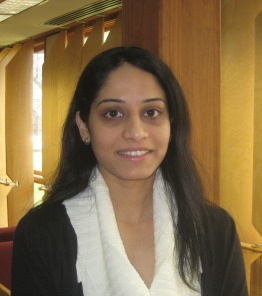By Mary Pritchard, Contributing Writer
Shrewsbury – Tejaswini Dalvi has a passion for physics, teaching, and getting kids excited about science. She is sharing that passion with preschoolers with the goal of sparking an interest in science that will continue throughout the youngsters” education experience.? Tejaswini, who lives in Shrewsbury with her husband and son, has a PhD in physics and is a research scientist at Clark University in Worcester.
“We moved here from Mumbai, India, about 2 years ago, when my husband became a resident doctor at St. Vincent Hospital,” she said. “My son was just one month old when we came to the United States.”
Tejaswini has designed and taught a science program through Shrewsbury Child Development Committee (SCDC), a volunteer organization that offers programs and activities for families with young children in Shrewsbury and surrounding communities. ?Tejaswini's roles as a research scientist at Clark and as a mother, along with her love of science and teaching, provide a natural framework for this science program for young children.
“In high school I loved science and math,” she said. “Somehow it was always physics for me – there was a natural draw to it – I loved it.? Growing up, my parents always encouraged us to do what we love, but they said “whatever you do, you really have to work hard.” In my work at Clark University, my research interests lie in the field of science education and my current focus is on elementary school children,” she said. “When I was a grad student in Germany, they were asking for English-speaking people to teach high school trigonometry.? I taught, and through that I discovered how much I liked connecting and interacting with the students and that I love teaching.”
She has created a class for children to learn about basic science concepts.
“We do this mostly through talking, with some little experiments and observations,” she said. “They learn through talking, seeing, and doing things. We use songs, puzzles, pictures and fun activities. We talk about things like the difference between weight and volume, floating versus sinking, and the water cycle chart. I wanted the children to take something home from each class. They are so young and really connect to “things” easily. They have more fun when they get to actually do something. Whether it is a chart, drawing, or a model, they can bring it home and show others what they have learned.”
The 3- and 4-year-olds enrolled in the first session made solar system models with foam balls and talked about the day and night cycle, using a flashlight as the sun.
“The activities have to be fun, but the fun doesn's take away the seriousness of the science,” she said. “It is all for the kids. Physics is a story that unfolds in front of them. If they see a rainbow, we can talk about the science behind it. We talk about how so many everyday things around us have an interesting explanation about “why,” and we can observe and explore this. We ask questions, discuss things – the science is not beyond their reach, and they make an attempt to learn. We let the little eyes see, little minds do the big thinking, allowing the children to ask questions and talk to us and each other. It is learning in a fun way.”
For more information about the science class, which SCDC hopes to run again this spring, visit www.scdc.org.













